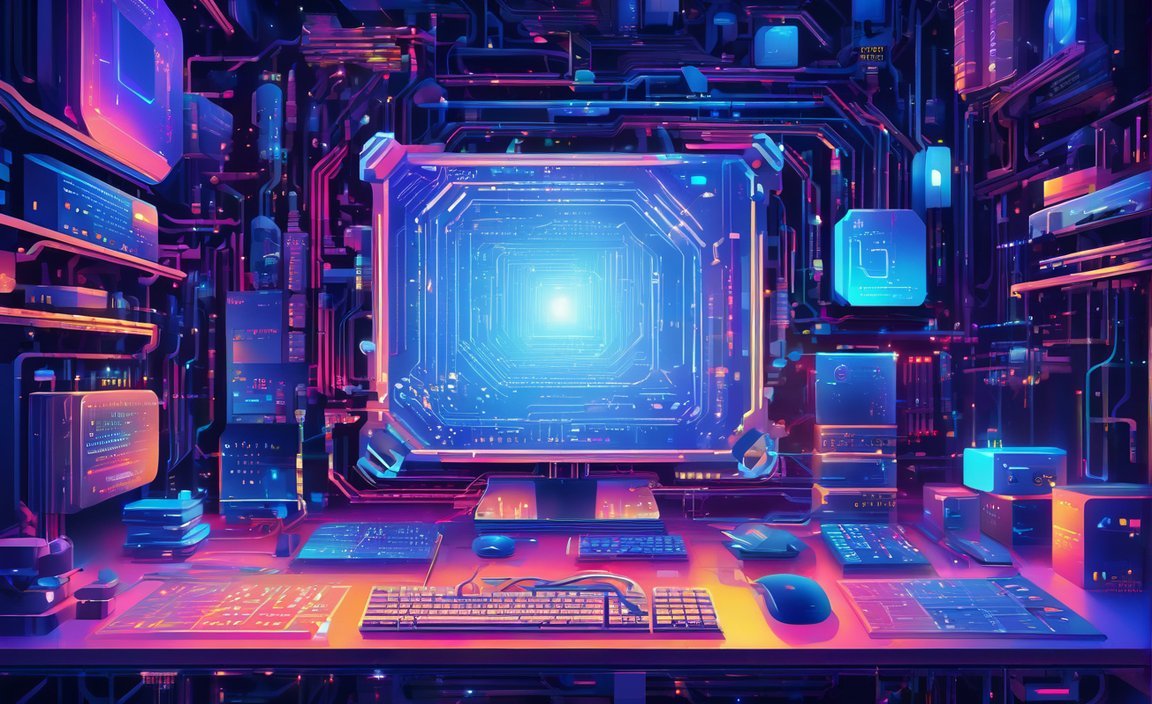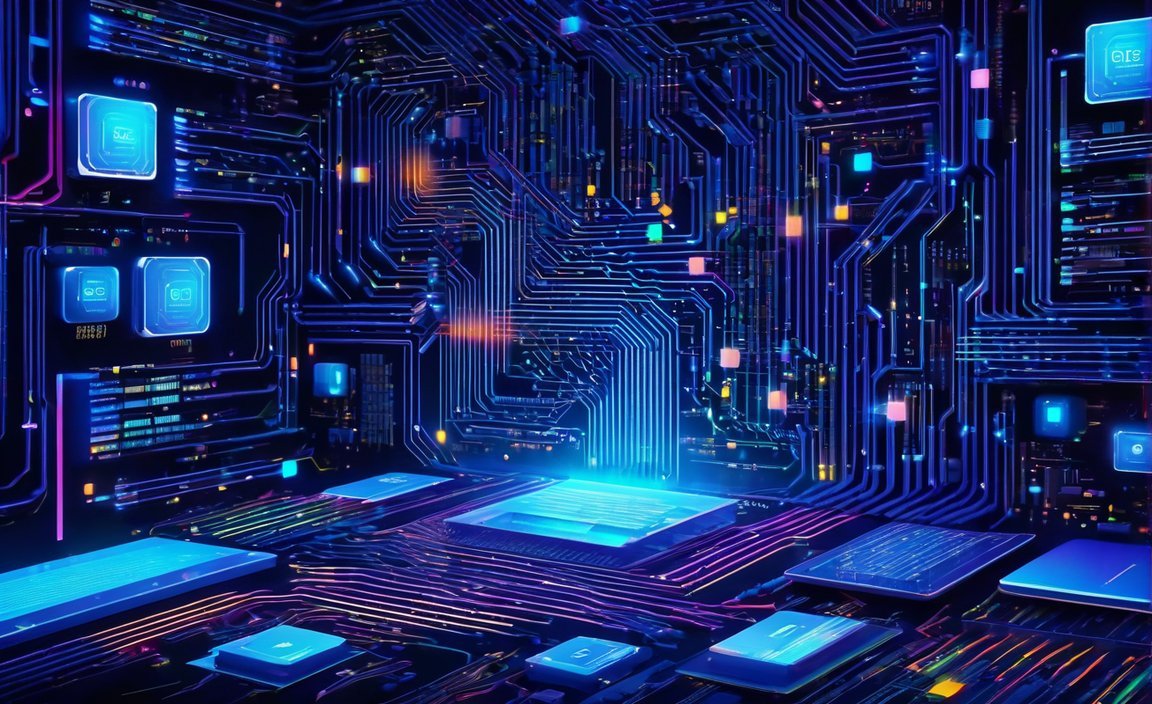Computer Science: it’s not all just coding and computers! Get ready to dig into a world of “whoa, that’s cool!” moments with these ten surprising and captivating facts about computer science. From the very first computer to the mind-boggling capabilities of modern-day machines, we’re about to challenge your understanding of technology. So, buckle up and let the digital journey begin!

Ten Fun Facts About Computer Science
Let’s dive into the world of bits, bytes, and algorithms with ten fun facts about computer science that might surprise you:
- Music Composition, But Make It Computer: Ever wonder if a computer could write a hit song? Well, back in 1957, a program did just that, creating the first-ever piece of original computer-generated music! This groundbreaking event paved the way for today’s world of algorithmic music creation. Who knows? Your favorite artist might have a silent computer partner!
- Pixels: The Building Blocks of Digital Images: Think of a digital image as a mosaic, where pixels are the tiny tiles. Each pixel is just a point of color, and when millions of them come together in a grid, voila! You get the stunning visuals we see on our screens. So, the next time you are mesmerized by a digital image, remember the humble pixel, the unsung hero of the digital art world.
- Email: From 1971 to Your Inbox: Imagine life before email – people actually wrote letters and waited weeks for a reply! Thankfully, in 1971, the first email was sent, and today, billions of these digital messages zip around the globe every single day. From catching up with friends to important work correspondence, email has revolutionized communication.
- The Mouse: A Love-Hate Relationship?: The computer mouse, that little device we navigate the digital world with, was invented back in 1963. At first, people weren’t so sure about it. But, this innovative tool, designed for more intuitive computer interaction, quickly won hearts (and desks) worldwide.
- From Calculators to Computers: The first computers weren’t the sleek machines we know today. They were more like giant calculators, mainly used for crunching numbers. Over time, their capabilities exploded, leading to the versatile devices we rely on for everything from entertainment to critical scientific research.
- Ladies in Tech: A Legacy That Lives On: Ada Lovelace, a brilliant mathematician from the 1800s, is considered the world’s first computer programmer. Her groundbreaking work laid the foundation for computer science, proving that women have always been pioneers in the tech world.
- Coding for Cats? It’s Not as Crazy as It Sounds! In 1964, a group of playful programmers created a special compiler designed to translate code written in a cat-themed language. While it was more for fun than practical use, it does make you wonder: could our feline friends have secret coding skills?
- 1983: The Year the Internet Was Born! The internet, the vast network that connects us all, came to life in 1983 with the introduction of TCP/IP. These communication protocols act like a global postal system, ensuring that data reaches its destination no matter where it originates.
- Gaming: From Pixels to Immersive Worlds: Remember those old-school text-based games? Well, computer games have come a long way! From those humble beginnings, we now have breathtaking virtual worlds that blur the lines between reality and fantasy. It’s hard to believe how far gaming has come in just a few decades.
- Artificial Intelligence: The Future is Now! AI is no longer a figment of science fiction; it’s here and it’s changing the world as we know it. From self-driving cars to personalized medicine, AI is automating tasks and powering the technologies we rely on every day. And, this is still just the beginning. Who knows what amazing AI-powered innovations await us in the future!
Did you know that there are 10 fun facts about electricity? From discovering its mysterious origins to understanding its vital importance in our daily lives, these captivating facts will surely spark your curiosity. Explore more about electricity here.
Did you know that there are 10 interesting facts about computers? From their revolutionary advancements to their impact on various industries, these fascinating facts will surely leave you amazed. Delve into the world of computers here.
Did you know that there are 10 interesting facts about dentists? From their historical roots to their essential role in oral health, these intriguing facts will make your next dental visit more intriguing. Discover more about dentists here.
Did you know that there are 10 interesting facts about fire? From its mesmerizing properties to its destructive power, these astonishing facts will ignite your curiosity. Uncover more about the wonders of fire here.

What are 10 Interesting Facts About Computers?
Let’s dive into some lesser-known facts that might just make you see your laptop in a whole new light:
- The Original Computer Was a Bit of a Space Hog: Imagine a computer taking up an entire room, weighing more than several elephants combined! That was ENIAC, the very first electronic computer. It’s amazing to think how far we’ve come from those gigantic machines to the sleek devices we have today.
- Your Keyboard Has a Hidden Talent: Next time you’re typing away, look at the middle row of your keyboard. You might be surprised to learn that “TYPEWRITER” is the longest word you can type using only those letters. It makes you wonder who else was trying to type “typewriter” on their computer back in the day!
- The First Computer Mouse Was a Bit Rough Around the Edges: We rely on computer mice every day, but did you know the very first one was made of wood? Back in 1964, Doug Engelbart crafted this pioneering device, proving that even the most advanced technology can have humble beginnings.
- Computers Are Constantly Under Attack: It’s a digital battlefield out there! Every single month, thousands of new computer viruses are created, making the work of cybersecurity experts incredibly challenging and crucial in keeping our digital lives safe. It’s like a never-ending game of cat and mouse between the good guys and the hackers.
- There Are Forgotten Heroes of the Computer Age: While we often hear about big names like Bill Gates and Steve Jobs, there are countless other brilliant minds whose contributions to computer science haven’t received the recognition they deserve. Unearthing these forgotten stories could change our understanding of how we got to where we are today.
- Computers Have Their Own Secret Language: You might think you’re fluent in “computer speak” with your HTML and coding skills, but computers actually communicate with each other using complex systems of codes and protocols. It’s a whole other level of language just for them!
- The Future of Computers Is in Constant Flux: We’re on the cusp of amazing advancements in artificial intelligence, machine learning, and the Internet of Things. These technologies have the potential to revolutionize the way we live, work, and interact with the world around us. Who knows what incredible things computers will be capable of in the near future!
Think about it:
- From room-sized behemoths to pocket-sized powerhouses, the evolution of computers is truly mind-blowing.
- The familiar QWERTY keyboard holds secrets and fun facts waiting to be discovered.
- Even the simplest tools we use today, like the computer mouse, have a fascinating backstory.
- The fight for cybersecurity is a constant race against evolving threats, highlighting the importance of staying vigilant online.
- Behind every technological breakthrough is a team of dedicated individuals, some of whom history has sadly overlooked.
- The language of computers is a complex and ever-evolving field, essential for the seamless functioning of our digital world.
- We’re living in a time of unprecedented technological advancement, with computers playing an increasingly central role in our lives.
The world of computers is full of surprises, and there’s always something new to learn. As technology continues to evolve at lightning speed, one thing’s for sure: the future of computers promises to be even more fascinating than its past!
What is a Fun Fact About Computer Science?
Did you know that the first person to truly crack the code of computer programming was a woman? We’re talking way back in the 1800s! Ada Lovelace, a math whiz, teamed up with Charles Babbage, the inventor of the first mechanical computer (think gears and steam!), to create the very first computer program. This thing they were building, called the Analytical Engine, was a beast, but Ada saw its potential. She basically wrote the rulebook for how this machine could be told what to do, making her the world’s first computer programmer.
Ever wondered about the world behind all the technology? Get ready to expand your horizons with ten fun facts about computer science that will make you appreciate the virtual realm like never before!
What is Interesting About Studying Computer Science?
Let’s really dig into what makes studying computer science so cool:
- It’s the Engine of the Digital Age: Almost everything we do these days involves computers in some way. From the apps on your phone to the websites you visit, computer science is the driving force behind it all.
- You Get to Be a Creator: Imagine designing your own app, building a website from scratch, or even creating a piece of software that solves a real-world problem. That’s the kind of power you gain with computer science skills. You’re not just a user anymore; you become a builder and innovator.
- The Job Market is Booming: Let’s be realistic – a good job is important. The cool thing about computer science is that it’s not just interesting; it’s also incredibly practical. Companies across the globe are practically begging for skilled computer scientists. We’re talking about a future with awesome job security and the chance to work on some seriously exciting projects.
- Always Something New to Learn: This field is constantly evolving. Just when you think you’ve got a handle on things, a new technology, programming language, or approach pops up. That might sound challenging (and it can be!), but it also means things never get boring. You’ll be constantly learning, growing, and pushing the boundaries of what’s possible.
- A Global Language: Computer science is like a universal language that everyone in the tech world speaks, no matter where they come from. It connects people from all walks of life who share a passion for technology, problem-solving, and innovation. It’s a passport to collaborating with brilliant minds from across the globe.
It’s Not All About Certainty:
One more thing that’s really exciting about computer science is that it’s not always about knowing the “right” answer. Some areas of study are still evolving, and even experts might disagree on the best approach to a problem. This means you get to be a part of shaping the future of the field! You can contribute your own ideas, experiment with different solutions, and maybe even challenge the status quo.
Want to Learn More?
This is just a glimpse into the fascinating world of computer science. There’s so much more to uncover, from artificial intelligence and machine learning to cybersecurity and data science. The possibilities are practically limitless! So, if you’re curious, don’t be afraid to dive in. You might be surprised at what you discover and the amazing things you’re capable of achieving.
What is a Fun Fact About the First Computer?
The first electronic computer, ENIAC, weighed a hefty 27 tons! To put that into perspective, that’s like the weight of three large elephants crammed into your living room.
What are 10 Facts About Technology?
- That First Computer? It Was a Behemoth: Picture this: the ENIAC, the world’s first electronic computer, was a colossal machine weighing over 27 tons! To put that in perspective, that’s heavier than three adult African elephants! This gigantic machine took up an entire room, a stark contrast to the sleek laptops and pocket-sized smartphones we have today.
- The OG Computer Mouse Was Carved from Wood: You read that right – no plastic, no fancy ergonomics back then. In 1964, Doug Engelbart unveiled the very first computer mouse, and it was fashioned from humble wood. This rudimentary pointing device relied on two wheels to track movement, a far cry from the laser precision of modern mice.
- 1981: The Year the First Computer Virus Reared Its Ugly Head: A 15-year-old high school student named Rich Skrenta unleashed the Elk Cloner virus upon an unsuspecting world. This mischievous program, far less malicious than the complex viruses we encounter today, served as a stark reminder that even in their infancy, computer systems were vulnerable to digital mischief.
- The Internet Is a Sprawling Digital Metropolis: Hold on to your hats – there are now over 2 billion websites on the internet! This mind-boggling number represents a virtually endless library of information, entertainment, and connection at our fingertips. From obscure hobbies to cutting-edge research, the internet has become the ultimate digital melting pot.
- 1971: “TEST” – a Simple Message That Launched a Revolution: Ray Tomlinson, the inventor of email, sent the first-ever electronic message – a simple “TEST” addressed to… himself. While seemingly insignificant, this act marked the birth of email communication, a technology that would reshape how we connect and share information across the globe.
- That First Cell Phone Wouldn’t Fit in Your Pocket: Imagine lugging around a phone that weighed a hefty 2 pounds! That was the reality of the first commercially available cell phone, the Motorola DynaTAC 8000X, released in 1973. And the price tag? A cool $3,995, which would be equivalent to over $10,000 today!
- Meet the Altair 8800 – Your Great-Granddaddy’s PC: In 1975, the Altair 8800 emerged as the first commercially successful personal computer, paving the way for the home computing revolution. Priced at $397, this kit computer required assembly and technical know-how, appealing to hobbyists and early adopters who dreamed of bringing computing power into their homes.
- The First Laptop? Let’s Just Say It Wasn’t Exactly “Portable.” The Osborne 1, released in 1981, holds the title of the first commercially available portable computer. But weighing a back-breaking 24 pounds, it was far from the sleek, lightweight laptops we know and love today.
- 1994: The Year the Touchscreen Took Center Stage: The IBM Simon Personal Communicator, released in 1994, wasn’t just a phone – it was a glimpse into the future. This groundbreaking device was the first to combine the functionalities of a cell phone and a PDA, complete with a touchscreen interface that would revolutionize how we interact with technology.
- Technology Is a River, Constantly Flowing and Evolving: As we delve deeper into the digital age, one thing remains certain – technology never stands still. From artificial intelligence to quantum computing, we stand on the cusp of a technological revolution that promises to reshape our world in ways we can only begin to imagine.
What are 10 Things That are Computers?
We’re not just talking about the sleek laptops and smartphones we’re used to. If a device can take in instructions, crunch some data, and spit out a result, it’s playing in the computer league.
- Your Car: Yep, that hunk of metal is practically a computer on wheels these days! From engine control units managing fuel efficiency to the fancy infotainment systems, your car is packed with microprocessors.
- Smart TVs: Gone are the days of simple television sets. Now, your Smart TV is basically a computer hooked up to a really great display. Streaming services, apps, internet browsing – it’s all powered by computational power.
- Calculators: This one might seem obvious, but it’s a classic example for a reason. Even a basic calculator can process mathematical operations, making it a simple but true computer.
- Digital Watches: Remember those old-school watches that just told time? Well, digital watches have taken things up a notch. They can track your steps, monitor your heart rate, and even connect to your smartphone – all thanks to those tiny computer chips inside.
- Traffic Lights: Ever wonder how those traffic lights change so seamlessly (well, most of the time)? It’s all thanks to embedded computers that monitor traffic flow and adjust the lights accordingly.
- ATMs: Those cash machines are essentially specialized computers connected to a bank’s network. They process your transactions, dispense cash, and might even let you deposit a check – all thanks to the power of computation.
- Digital Cameras: Gone are the days of film! Digital cameras rely on sophisticated image sensors and processors to capture, store, and process those stunning photographs.
- Gaming Consoles: Playstation, Xbox, Nintendo Switch – these aren’t just entertainment systems; they are powerful computers designed specifically for gaming. With lightning-fast processors and dedicated graphics cards, they can render complex visuals and immersive gameplay experiences.
- Medical Imaging Equipment: From X-ray machines to MRI scanners, the medical field relies heavily on computer technology. These devices use complex algorithms to process data and create images that help doctors diagnose and treat patients.
- Airplanes: Modern aircraft are essentially flying computers. From autopilot systems that keep the plane on course to complex navigation systems that guide pilots safely to their destinations, computers play a critical role in aviation.
What is 10 in Computer?
Instead of ten fingers, computers only have two states: on or off, represented by a 1 or a 0. This is their language – binary code.
To say “ten,” we use the code “1010”. It’s like a secret code that makes perfect sense to your computer, even if it looks like gibberish to us!
What are 10 Computer Uses?
- Staying Connected Near and Far: Email, social media, video calls – they all depend on computers to instantly connect us across continents.
- The Ultimate Information Desk: The internet, accessible through our trusty computers, has become a vast library holding almost every bit of information imaginable.
- Learning Goes Digital: From online courses and digital libraries to interactive simulations that make learning fun, computers have become essential learning companions.
- Kicking Back and Relaxing: Streaming your favorite shows, battling it out in epic video games, discovering new music – computers offer a buffet of entertainment options.
- Getting Things Done: Creating presentations, whipping up spreadsheets, managing schedules, and crafting documents – computers help us stay organized and productive.
- Money Matters Made Easier: Online banking, budgeting apps, investment platforms – computers have made it incredibly convenient to manage our finances.
- Healthcare Gets a Tech Upgrade: Computers are transforming healthcare. They’re used to manage patient records electronically and are accelerating medical research.
- Unraveling Scientific Mysteries: Scientists rely on computers as their trusty lab partners, crunching massive datasets and running complex simulations.
- Designing the Future: From designing sleek cars and towering skyscrapers to developing cutting-edge smartphones, computers have become essential tools for creating and refining designs in a virtual space.
- The Engine of Modern Business: Computers help companies manage customer relationships, track inventory, analyze sales data to make smarter decisions – basically, they’re streamlining every aspect of running a business in our digital world.
What is a Computer? 10 Key Points
- From Room-Sized to Pocket-Sized: The very first computers were massive machines, like the ENIAC, which weighed 27 tons! Thankfully, technology has shrunk those behemoths down to the smartphones we carry in our pockets.
- The Never-Ending Battle Against Viruses: The first computer virus appeared in 1974. Every month, thousands of new threats pop up. Cybersecurity is more important than ever!
- The PC Revolution: Computers for Everyone: PCs made computers affordable and accessible to everyday people, sparking a revolution in how we work, learn, and connect.
- The Language of Computers: It’s All Just 1s and 0s: Binary code is the language computers understand: a secret code where everything boils down to two digits: 1 and 0.
- Most of the World’s Money Doesn’t Actually Exist…Physically: 90% of the world’s money isn’t printed bills or coins; it only exists as digital information on computer networks!
- Water-Powered Computers? You Bet! In 1936, some clever Russian engineers actually built a computer that ran on water!
- Computers: Not Just Machines, But Problem-Solvers: Computers aren’t just for entertainment; they’re incredibly powerful tools for tackling some of the world’s biggest challenges.
- The Future of Computing: It’s All About to Get Even More Amazing: We’re on the verge of breakthroughs in artificial intelligence (AI), quantum computing, and other mind-blowing technologies.
- The Importance of Digital Literacy: With computers playing such a huge role in our world, it’s more important than ever to be digitally literate, understanding how to use computers and technology effectively and responsibly.
- Computers: Tools for Creativity and Connection Computers are also amazing tools for creativity and connection. They allow us to express ourselves and connect with people from all over the world.
Who Invented the Computer? 10 Points
- Charles Babbage’s Vision: The Analytical Engine: In the 1800s, Charles Babbage conceived the “analytical engine,” a mechanical computer powered by steam, laying the groundwork for modern computers.
- Ada Lovelace: The First Programmer: Ada Lovelace, a brilliant mathematician, recognized the potential of Babbage’s machine and wrote instructions for it, becoming the world’s first computer programmer.
- The Electronic Spark: Atanasoff-Berry Computer (ABC): John Atanasoff and Clifford Berry developed the ABC in 1939, a pioneering electronic computer demonstrating the power of electronics for complex calculations.
- Konrad Zuse’s Z3: Another Contender for First: Konrad Zuse developed the Z3 in 1941, considered by some to be the first programmable computer.
- ENIAC: The Room-Sized Giant: In 1946, the Electronic Numerical Integrator and Computer (ENIAC) emerged, a massive, general-purpose electronic computer, marking a turning point in computing history.
- The Dawn of Personal Computing: Altair 8800: The Altair 8800, considered the first commercially successful personal computer, hit the market in the 1970s, bringing computing power into homes.
- TRS-80: Another Early Player: The TRS-80 followed closely on the heels of the Altair, further fueling the personal computer revolution.
- Apple’s Rise: User-Friendly Computing: Apple, founded by Steve Jobs and Steve Wozniak, introduced the Apple II, which, with its user-friendly design and graphics, made personal computing accessible to a wider audience.
- The Macintosh: A Graphical Revolution: The iconic Macintosh, released in 1984, revolutionized human-computer interaction with its graphical user interface and mouse.
- Tim Berners-Lee and the World Wide Web: Tim Berners-Lee’s invention of the World Wide Web in 1989 transformed communication, information access, and commerce, shaping the internet as we know it today.
















